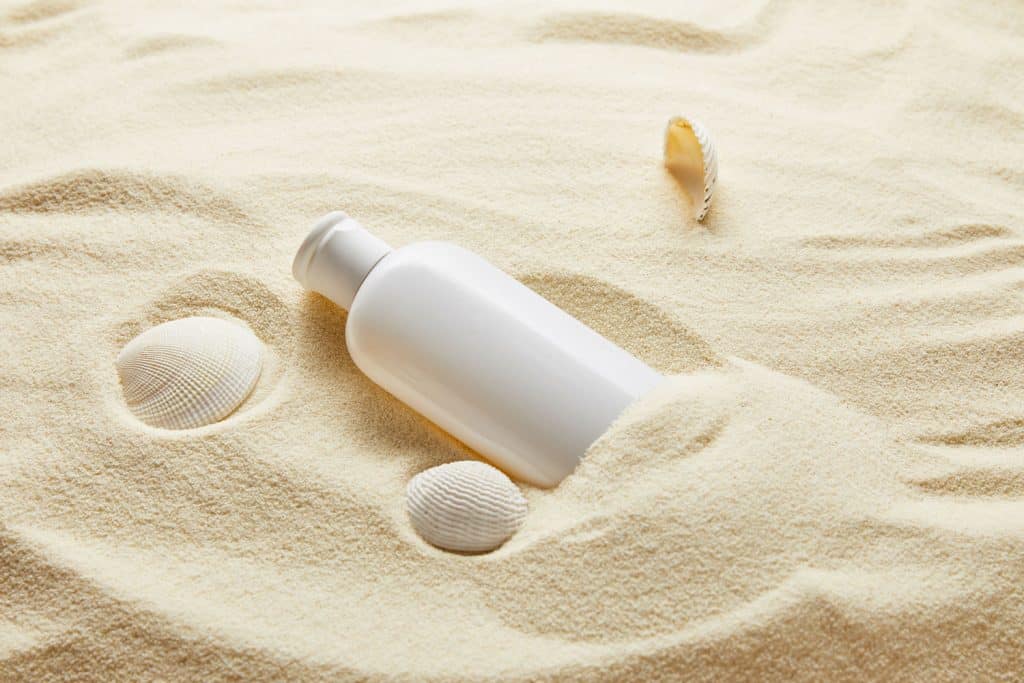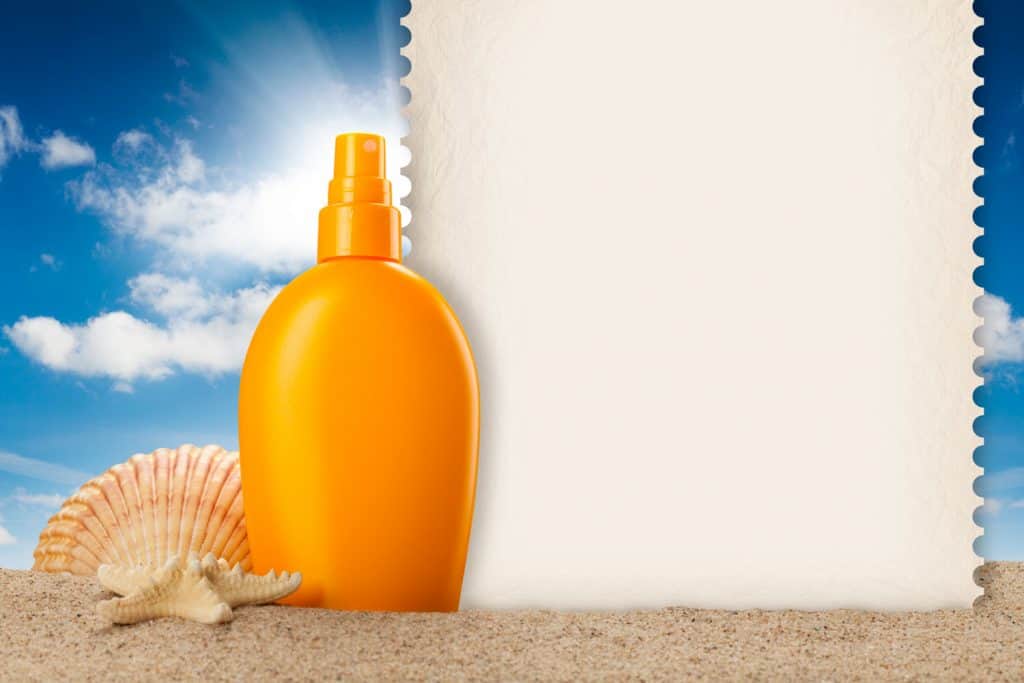If you are wondering if your sunscreen can replace your daily moisturizer, you're not alone. There can be a lot of confusion surrounding the use of moisturizer and sunscreen as daily skincare products, whether they can be combined, and which one should be applied first. We've researched this topic, and in this post, we will go over it in detail.
Yes. You can replace moisturizer with sunscreen if the sunscreen has a sufficient amount of moisturizing ingredients. These ingredients include ceramides, emollients, and humectants, which help prevent moisture loss that lubricates the skin. Also, you can use certain moisturizers for sunscreen if you're in a pinch. However, it is essential to know that they may not provide the same sun protection level as sunscreen.
There is a lot to consider before deciding to swap out your sunscreen with moisturizer or vice versa. Keep reading for all the details!
![A beautiful woman putting sunscreen on her face at the beach, Can Sunscreen Replace Moisturizer? [And Vice Versa]](https://stylecheer.com/wp-content/uploads/2021/04/Can-Sunscreen-Replace-Moisturizer-And-Vice-Versa-683x1024.png)
This article may include affiliate links and elements that were carefully created by our team using advanced ai to help you envision the best style advice.
Replacing Moisturizer with Sunscreen and Vice Versa

Not all sunscreens are created equal. Some formulas have many protective emollients in them, and others don't and are more lightweight. For the latter, you may need to apply a heavy sunscreen layer to receive the moisturizing benefits of sunscreen. The downside to this is that you may find that the sunscreen feels heavy on your skin or too greasy, so it's important to experiment with a few sunscreens if you plan to use them as a moisturizer.
When it comes to using a moisturizer as a sunscreen, some natural products protect against harmful ultraviolet rays, which we will discuss later. However, most commercial moisturizers such as lotions and creams generally don't protect against UVA and UVB rays that sunscreen does, which would make them ineffective at protecting your skin.
There are also commercial moisturizers that contain sunscreen; however, the SPF value is usually around 15, which is relatively inefficient for sun protection. Most dermatologists recommend an SPF of at least 30 for adequate protection from the UVB and UVA rays.
Is It Good To Put Sunscreen On Your Face Every Day?
Yes, depending on the sunscreen. Facial skin is more sensitive than any of the skin on your body. This means that it's more likely to become irritated, red, or break out from skincare products. The best way to prevent irritation when applying sunscreen to your face is to look for products that are labeled "oil-free" or "non-comedogenic" or "perfume-free," as they can cause allergic reactions. This is especially if you have sensitive skin.
We've researched some of the best sunscreen options for your face. Let's take a look:
Supergoop! Unseen Sunscreen SPF 40
This sunscreen is beneficial for users that have darker skin tones. It is lightweight and can be used as an excellent primer for makeup or other moisturizers. It's also free of fragrances, oils, and dyes. It has a sheer matte finish and can be used on all skin types. If you are looking for a facial sunscreen with a higher SPF rating, this sunscreen by Supergoop may be just the product you're looking for.
Read more about this product on Amazon.
SkinMedica Total Defense + Repair Sunscreen SPF 34
If you need a sunscreen that can protect your skin and has multiple anti-aging properties, look no further. This hydrating sunscreen contains shea butter and vitamin C and C to help you stay safe from harmful ultraviolet rays. It also has other moisturizers to keep your skin soft and supple throughout the day.
Check out this product on Amazon.
Proactiv MD Daily Oil Control Face Moisturizer With Sunscreen SPF 30
Here is another great sunscreen and moisturizer combo for those with sensitive skin. The great thing about this sunscreen is that you don't have to worry about any gray-colored tint on your skin after applying the sunscreen. It works wonderfully to control shine and gives you a clean matte finish throughout the day.
Here is a great product to consider if you're looking to streamline your daily routine and keep your skin protected from harmful sun rays. The sunscreen is also ideal for acne-prone skin and doesn't contain oils that will clog your pores.
Learn more about this moisturizer sunscreen combo on Amazon.
Cetaphil Pro Oil Control Moisturizing Lotion SPF 30
It can be hard to find a sunscreen that also works as a moisturizer for oily skin. But here is one that's worth taking a look at. Cetaphil's Pro Oil sunscreen has an SPF of 30 and helps control oil while providing sufficient hydration. It's all also lightweight, fragrance-free, and non-comedogenic. If you need a fast-absorbing sunscreen that will leave your skin with a flawless matte finish, consider this product for your daily wear.
Find out more details about this sunscreen on Amazon.
CeraVe AM Facial Moisturizing Lotion SPF 30
This sunscreen by CeraVe offers the perfect combination of moisturizer and sun protection. It contains ceramides, anti-inflammatory antioxidants, and it's also oil-free. This lightweight formula has an SPF 30 and contains hydraulic acid to help your skin retain its moisture throughout the day. It's lightweight without the greasy feel of a heavy moisturizer.
What Can You Use As A Substitute For Sunscreen?
Sometimes you may run out of sunscreen and need a little sun protection a pinch--or you may prefer not to use sunscreen at all. You'll be happy to know that there are several products that you can use instead. Let's take a look.
Red Raspberry Seed Oil
You may be surprised to learn that raspberry seed oil has natural SPF protection. It's also a great all-natural moisturizer and can be used as a daily sunscreen to keep your skin safe from ultraviolet rays. You can buy red raspberry seed oil at local whole health stores or online.
Find raspberry seed oil on Amazon.
Coconut Oil
In the past ten years, coconut oil has become a mainstay in many American households. Not only is it an excellent moisturizer, but it also provides a notable amount of SPF protection. If you are in a pinch and looking for a quick alternative to your daily sunscreen product, try dabbing a little coconut oil on your skin before you head out for extra protection during the day. Coconut oil also contains vitamin E and can help hydrate the skin and keep it soft and healthy.
Find cold-pressed coconut oil on Amazon.
Avocado Oil
Avocado oil has a high amount of fatty acid and works as a natural source of essential vitamins. This versatile oil can also give you a small dose of SPF protection if you are in a rush. You can find coconut oil at any local supermarket, or you can search for discounts online for this nutrient-dense sunscreen alternative.
Carrot Seed Oil
You may not hear a lot about carrot oil as you do other natural oils, but it is worth noting when it comes to sunscreen protection. It also has natural moisturizer properties to help speedy recovery of wounds and burns. The beta carotene in carrot seed oil has strong antioxidant properties that reduce any damage done by ultraviolet rays. You can typically find carrot seed oil available online or at any health store.
Read more about this carrot seed oil on Amazon.
Which Is Better For You: Sunscreen Or Moisturizer?

Most dermatologists will probably agree that sunscreen is the better option when it comes to skincare. The reason is that one in five people develop skin cancer, and it's more often than not because of the damage done from exposure to ultraviolet rays. The health benefits that come with using sunscreen significantly outweigh any health benefits from using a daily moisturizer.
However, it isn't to say that moisturizers aren't beneficial, especially when combating skin inflammation, cracking, and itching. However, if you spend a lot of time outside, your skin will benefit more from daily sunscreen protection than from moisturizers.
How Do You Apply Both Sunscreen And Moisturizer?
If you plan to use both sunscreen and moisturizer simultaneously, it's best to apply the moisturizer first and leave the sunscreen as the final step in your skincare routine. Experts do not recommend mixing the two products, as it may cause either of the equalities to diminish. It's also helpful to ensure that your skin has thoroughly absorbed your moisturizer before applying a sunscreen layer on top.
Wrapping Things Up
We hope that this post has provided you with a better outlook on sunscreen and moisturizer benefits and how they can work in tandem with one another.
Before you go, be sure to check out our other posts:









![Scientist holding Cyanoacrylate glue, Is There An Eyelash Glue Without Cyanoacrylate? [A Guide to Finding Safe Alternatives] - 1600x900](https://stylecheer.com/wp-content/uploads/2023/09/shutterstock_2238414685-300x169.jpg)
![Applying lash glue onto fake eyelashes, Why Is My Lash Glue Not Sticking? [Common Reasons and Solutions] - 1600x900](https://stylecheer.com/wp-content/uploads/2023/09/shutterstock_1059533828-300x169.jpg)
![Pouring black lash glue onto a small mat, What Glue Do Lash Techs Use? [A Guide to Lash Extension Adhesives] - 1600x900](https://stylecheer.com/wp-content/uploads/2023/09/shutterstock_1541038103-300x169.jpg)